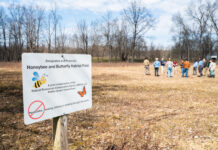SALEM, Ohio – Pennsylvania has the most far-reaching farmland preservation program in the United States, encompassing some 320,000 acres.
And that’s just what’s recorded at the state level. Thousands more acres have been preserved by the coffers in county or township or private offices.
But it’s still not enough.
The Keystone State took action last month to add even more acreage to those ranks.
Gov. Edward Rendell signed legislation May 17 to expand the state’s conservation easement program, allowing smaller tracts of land to enroll where they previously could not.
The new law also gives counties and nonprofits a bigger role in saving farms statewide.
Smaller guys, too. In a news release, Rendell said the need to safeguard smaller farms, not just large farms, in areas of high growth is important to maintaining the state’s agricultural heritage.
The law, proposed as Senate Bill 723, amends the state’s Agricultural Area Security Law.
It previously required landowners have at least 50 acres to apply for the easement program, but under new law, landowners with as little as 35 acres can apply.
In addition, parcels at least 10 acres used to grow a crop unique to the area, or adjacent to a property with an already-existing conservation easement, are now eligible.
The addition gives the state a tool to build larger areas of contiguous farmland blocks and encourages more participation, according to Mike Pechart, policy director for the Pennsylvania Department of Agriculture.
“Especially in southeast Pennsylvania, there are a lot of smaller farms that aren’t 50 acres, but they generating significant dollars. Before now, they weren’t even eligible for the state funding,” Pechart said.
Size matters. Size and location also matter when it comes to funding the easements.
In the case of 35-acre parcels, only 50 percent of the easement purchase funds can be state funds, and the rest must be made up by local matches.
Easements that meet the 50-acre minimum requirement may be fully funded by the state.
Local involvement. Townships and other local entities may continue to fund easements on their own, too, Pechart said. But the new law is fostering teamwork all the way from the farmstead to the statehouse.
“Before this, townships and these smaller groups were never allowed to partner with the county or state before,” Pechart said. “It really limited what could be done.”
With the new law, state and local governments can partner with nonprofits to boost available funding to purchase easements.
A nonprofit must prove to the State Agricultural Land Preservation Board, or an eligible county, that it is tax exempt under the provisions of the Internal Revenue Code, to be eligible.
It must also prove that it has experience acquiring, through purchase, donation, or transfer, an agricultural or other conservation easement.
Hefty matters. Pennsylvania currently has more than 2,000 farms on the waiting list to sell agricultural easements, and it would take billions of dollars to preserve all them, Pechart said.
Last fall, the state’s Growing Greener initiative added an additional $80 million over the next five years to the easement purchase program.
In 2006, the Keystone State will spend approximately $100 million of state money on the project, according to Pechart.
That spending is the largest-ever, one-year allocation of state dollars, Pechart said.
Since its inception in 1989, the state has preserved are more than 2,800 farms totaling nearly 325,000 acres. Fifty-six of 67 counties have county-level funding programs, Pechart said.
Other changes. The law protects land within an agricultural security area from eminent domain seizures without approval from the state’s Agricultural Lands Condemnation Approval Board.
With the latest changes, any public utility provider whose underground facility would permanently disrupt tilling the soil is also required to seek approval from the board. Previously, utilities weren’t required to jump through those same hoops.
Counties are also given authority to monitor and enforce easements.
The law also gives the state authority to reimburse land trusts up to $5,000 in expenses for each easement acquired, and to support the department of agriculture in administrative expenses. This fund is capped at $200,000.
(Reporter Andrea Myers welcomes reader feedback by phone at 1-800-837-3419 or by e-mail at amyers@farmanddairy.com.)
Get 4 Weeks of Farm and Dairy Home Delivered









